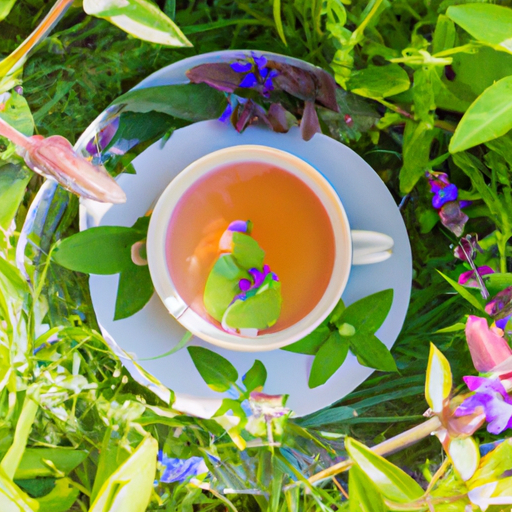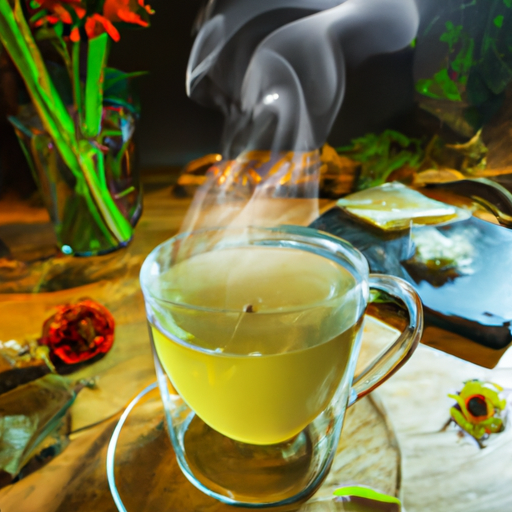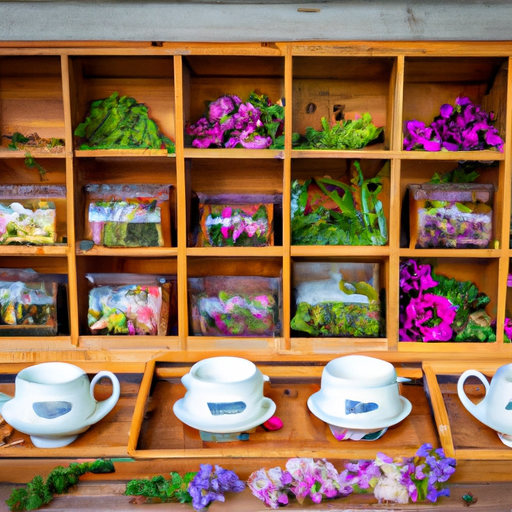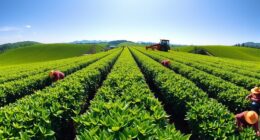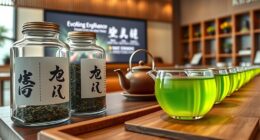When it comes to tea, there can be some confusion about what qualifies as herbal tea. Some may argue that herbal tea is not technically tea because it is not derived from the Camellia sinensis plant. However, I am here to clarify this misconception and explain what truly constitutes herbal tea.
Herbal tea, also known as tisane, is a beverage made from the infusion of various plants, herbs, and botanicals. Unlike traditional tea, which is derived from the tea plant, herbal tea is caffeine-free and offers a wide range of flavors and health benefits.
In this article, I will delve into the world of herbal tea, exploring its common ingredients, brewing methods, flavor profiles, and even some delicious recipes. I will also discuss the numerous health benefits associated with herbal tea consumption, including its potential to boost immunity, aid digestion, and promote relaxation.
So, if you’re curious about what counts as herbal tea and want to explore the wonderful world of natural infusions, join me on this journey of discovery. Get ready to sip, savor, and experience the true essence of herbal tea.
Key Takeaways
- Herbal tea is made from various plants, herbs, and botanicals, excluding Camellia sinensis.
- Herbal tea is caffeine-free and offers a wide range of flavors and health benefits.
- Herbal teas can help with sleep and relaxation, soothe digestion, reduce inflammation, and support heart health.
- Proper storage in an airtight container in a cool, dark place is important to maintain freshness and flavor.
Definition of Herbal Tea
Herbal tea, often referred to as tisane, is a beverage made from the infusion of herbs, spices, flowers, or other plant materials, excluding the traditional tea plant, Camellia sinensis. The history of herbal tea dates back thousands of years, with different cultures around the world incorporating it into their daily lives.
In ancient China, herbal tea was believed to have medicinal properties and was used to treat various ailments. In Egypt, herbal tea was consumed for its refreshing and soothing qualities. Native Americans used herbal tea in their traditional healing practices.
Today, herbal tea is enjoyed for its wide range of flavors and potential health benefits. It can be made with a variety of ingredients, including chamomile, peppermint, ginger, and hibiscus.
Transitioning into the subsequent section about common herbal tea ingredients, let’s explore the diverse flavors and aromas that these ingredients bring to herbal tea.
Common Herbal Tea Ingredients
Explore the vast array of ingredients in your favorite infusions, from soothing chamomile to invigorating peppermint. Herbal teas aren’t just delicious, but they also offer various health benefits.
For example, chamomile tea is known for its calming properties and can help with sleep and relaxation. Peppermint tea, on the other hand, is often used to soothe digestion and relieve stomach discomfort. Other common herbal tea ingredients include ginger, which can aid in digestion and reduce inflammation, and hibiscus, which is rich in antioxidants and can support heart health.
To brew herbal tea, simply steep your chosen ingredients in hot water for several minutes, depending on the desired strength. This process allows the herbs to release their flavors and beneficial compounds.
With a wide range of ingredients and brewing techniques, there’s an herbal tea to suit every taste and need. Moving on to brewing herbal tea, let’s explore the different methods for creating the perfect cup of herbal goodness.
Brewing Herbal Tea
Discover the art of brewing a soothing cup of tea that will transport you to a state of relaxation and bliss. Brewing herbal tea is a delicate process that requires attention to detail and the right techniques to extract the full flavors and benefits of the herbs. To get started, choose high-quality herbal tea brands known for their exceptional taste and quality ingredients. The brewing process varies depending on the type of herbal tea, but generally, you will steep the herbs in hot water for a few minutes. To create a stronger flavor, you can increase the steeping time. Remember to follow the instructions on the packaging for the best results. Now, let’s delve into the fascinating world of flavor profiles of herbal tea.
Flavor Profiles of Herbal Tea
When it comes to brewing a perfect cup of herbal tea, it’s fascinating to explore the wide range of flavor profiles that can transport your taste buds to a world of relaxation and bliss.
Herbal teas offer a plethora of unique flavors that cater to different preferences. From the refreshing and citrusy notes of lemon verbena to the delicate floral undertones of chamomile, there is a flavor to suit every palate.
Some herbal teas, like peppermint, offer a cooling and invigorating sensation, while others, like lavender, provide a calming and soothing experience.
Experimenting with different herbal teas can also be a fun way to enhance your meals. Pairing a fruity hibiscus tea with a light salad or enjoying a spicy ginger tea with your favorite Asian cuisine can elevate your dining experience.
As we delve into the health benefits of herbal tea, it’s important to remember the incredible flavor profiles that make it a truly enjoyable beverage.
Health Benefits of Herbal Tea
Indulging in a cup of herbal goodness can do wonders for your well-being. Herbal tea isn’t just a delicious beverage, but it also offers numerous health benefits. Here are some of the key benefits of drinking herbal tea:
-
Boosts the immune system: Herbal teas like echinacea and elderberry are known for their immune-boosting properties.
-
Relieves stress: Chamomile and lavender teas have calming effects on the body, helping to reduce stress and promote relaxation.
-
Supports digestion: Peppermint and ginger teas can aid digestion and soothe an upset stomach.
-
Promotes better sleep: Herbal teas like valerian root and passionflower can help improve sleep quality and treat insomnia.
-
Provides antioxidants: Many herbal teas, such as green tea and hibiscus tea, are rich in antioxidants that can help fight free radicals and reduce the risk of chronic diseases.
These are just a few examples of the health benefits that herbal tea can provide.
In the next section, we’ll explore herbal tea blends and recipes to further enhance your tea-drinking experience.
Herbal Tea Blends and Recipes
To fully immerse yourself in the world of herbal infusions, the delightful blend of different herbs and spices in tea recipes will take your tea-drinking experience to new heights.
Herbal tea blends not only offer a refreshing and flavorful taste but also provide a wide range of health benefits. From soothing chamomile to invigorating peppermint, there are countless herbal tea varieties to explore. Each blend has its own unique combination of herbs, carefully selected to promote specific health benefits such as relaxation, digestion, or immune support.
Whether you prefer a calming bedtime blend or an energizing morning mix, there is a herbal tea recipe for every mood and occasion. These blends can be easily customized to suit your taste preferences and desired health benefits. So, let’s dive into the wonderful world of herbal tea blends and discover the perfect cup for you.
In the next section, we’ll explore some helpful tips for choosing and storing herbal tea, ensuring that you always have a fresh and flavorful brew on hand.
Tips for Choosing and Storing Herbal Tea
When it comes to selecting high-quality herbal tea, there are a few key points to keep in mind. First, look for loose leaf tea rather than tea bags, as loose leaf tea tends to have a higher quality and better flavor. Secondly, pay attention to the source and the ingredients of the tea to ensure that they’re of the highest quality. Finally, consider the aroma and appearance of the tea, as these can also be indicators of its quality.
Proper storage methods are essential to maintain the freshness and flavor of herbal tea. To keep the tea at its best, store it in an airtight container in a cool, dark place, away from direct sunlight and moisture. Avoid storing it near spices or strong-smelling foods, as tea can easily absorb odors.
Additionally, be mindful of the shelf life of the tea and try to consume it within the recommended time frame for optimal taste and potency.
Selecting high-quality herbal tea
Sipping on a steaming cup of fragrant herbal tea transports you to a serene garden, as you carefully select the highest quality blend. When choosing herbal tea for relaxation and stress relief, it is important to consider the best time to drink it. For example, chamomile tea is known for its calming properties and is best enjoyed before bedtime to promote a good night’s sleep. Green tea, on the other hand, contains L-theanine, which helps to reduce stress and improve focus, making it an ideal choice for a mid-afternoon pick-me-up. To help you visualize the different options available, here is a table showcasing some popular herbal teas and their benefits:
| Herbal Tea | Benefits |
|---|---|
| Chamomile | Calming and promotes sleep |
| Peppermint | Aids digestion and relieves headaches |
| Lavender | Reduces anxiety and stress |
| Lemon Balm | Enhances mood and supports relaxation |
| Ginger | Relieves nausea and boosts immunity |
As you explore the world of herbal tea, remember to store your blends properly to maintain freshness.
Proper storage methods to maintain freshness
After selecting high-quality herbal tea, it’s crucial to properly store it to maintain its freshness and flavor. Proper storage methods play a vital role in preserving the delicate aromas and beneficial properties of herbal tea.
When it comes to maintaining freshness, a few key factors should be considered. Firstly, it’s essential to store herbal tea in a cool and dry place away from direct sunlight, as exposure to heat and light can accelerate the deterioration process.
Additionally, keeping the tea in an airtight container will prevent moisture and air from seeping in, helping to preserve its freshness for a longer period.
Lastly, it’s important to avoid storing herbal tea near strong odors, as they can be absorbed and alter the taste.
By following these proper storage methods, you can ensure that your herbal tea remains fresh and full of flavor for a delightful tea-drinking experience.
Frequently Asked Questions
Are all herbal teas caffeine-free?
Yes, not all herbal teas are caffeine-free. While some herbal teas like chamomile and peppermint are naturally caffeine-free and can promote better sleep and digestion, others like black tea may contain caffeine and could potentially affect sleep quality.
Can herbal teas be consumed by pregnant women?
Herbal teas can be consumed by pregnant women, but it’s important to choose ones that are safe and avoid those with potential negative effects on fetal development. It’s recommended to consult with a healthcare professional and follow the recommended dosage.
Can herbal teas be used for medicinal purposes?
Using herbal teas for medicinal purposes can be risky. While they may be effective in treating common ailments, it’s important to consult a healthcare professional to understand potential risks and ensure their efficacy.
Are there any side effects associated with drinking herbal teas?
Yes, there can be potential interactions between herbal teas and certain medications. Some herbal teas may affect sleep quality, especially those containing caffeine or stimulating herbs like ginseng.
Can herbal teas be used to replace medication for certain health conditions?
Herbal teas are amazing! They offer a wide range of benefits, from soothing digestion to boosting immunity. While they can’t completely replace medication, they can certainly complement treatment for certain health conditions.
Conclusion
In conclusion, herbal tea is a delightful infusion that not only tantalizes our taste buds but also offers a cornucopia of health benefits. It is a treasure trove of flavors, with its diverse range of ingredients, from soothing chamomile to invigorating peppermint. Whether you enjoy it hot or iced, this aromatic elixir is a comforting companion in any season. So, next time you sip on a cup of herbal tea, remember that you’re indulging in a concoction that nourishes both body and soul. Cheers to the wonders of nature!



